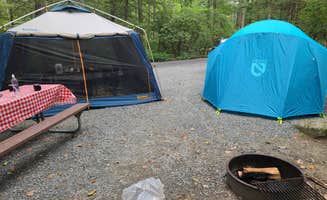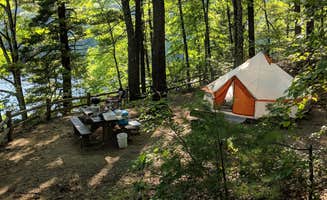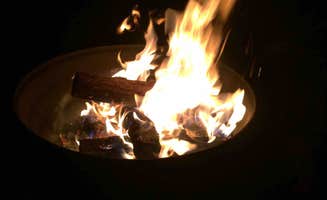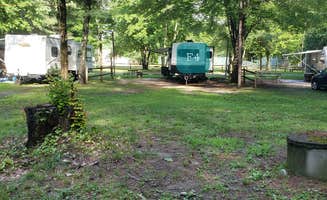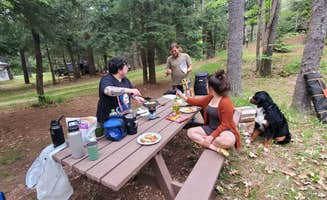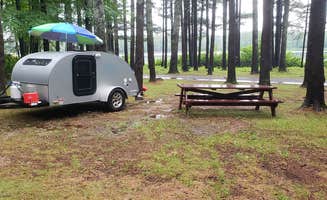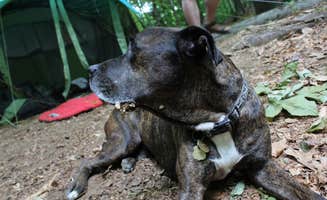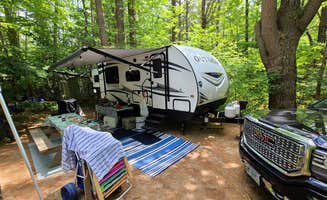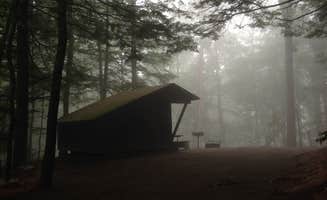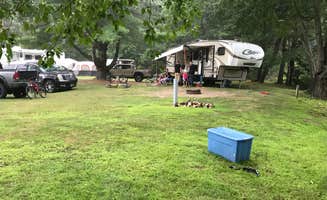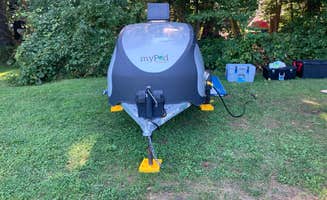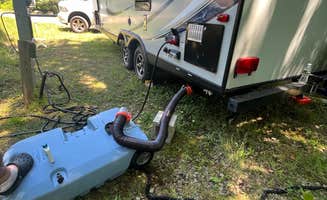Camping sites near Erving, Massachusetts are concentrated along the Millers River valley at elevations between 400-600 feet. The area marks the transition zone between the Connecticut River Valley and the higher elevations of north-central Massachusetts, creating a diverse landscape of rolling hills, ponds, and mixed forests. Summer temperatures typically range from 55-85°F, with July and August seeing average highs around 82°F and nighttime lows in the mid-50s.
What to do
Kayaking on Tully Lake: This man-made lake provides excellent flat-water paddling opportunities with islands to explore. "We rented kayaks right at the campground for a paddle around Tully Lake. Great trip! We will be returning," says Megan G. about Tully Lake Recreation Area.
Hiking to Doane's Falls: Located near Tully Lake, this series of waterfalls offers a scenic and relatively easy hiking experience. "If you'd like to hike with children, there is an easy hike close to the entrance, along Doane's Falls, a series of 5 waterfalls along an ascending path through a wooded area," notes a visitor.
Paddle boarding on Lake Dennison: The calm waters make this an ideal spot for paddle boarding and kayaking. "We can drop our paddle boards in any time and explore the lake. There is a tiny swimming beach on the campground side and we try to stay as close as possible to it," explains Juliet P. about Lake Dennison Recreation Area Campground.
Rail trail access: The Ashuelot Rail Trail connects directly to some campgrounds in the region. "You can pick up the Ashuelot Rail Trail at the campground. They have canoes and kayaks on site, plus a shuttle service for water sports or biking," reports Carry M.
What campers like
Spacious wooded sites: Many campgrounds in the area offer good separation between campsites. "Sites on the North side are spacious & quiet. The other side of the campground (east) has a lot of noise pollution from the nearby road which is used by logging trucks," notes Bonnie B. about Lake Dennison Recreation Area.
Direct lake access: Waterfront sites are particularly valued at Otter River State Forest. "The sites that are near the small pond are generally larger and have better space for pitching a tent," explains Jean C., adding that sites 65, 67, and 68 are walk-in sites with "the tent area lower, closer to the water."
Hiking trail connections: The region offers many interconnected trails. "There are several lookouts on the journey to the summit, and the view from the top is amazing," shares Jake F. about hiking at Monadnock State Park, which includes the Gilson Pond Area Campground.
Clean facilities: Many campgrounds maintain good bathroom facilities. "The bathrooms/showers are centrally located, but there are pit toilets distributed throughout the campground. The pit toilets are clean and, this early in the season at least, odorless, with waterless hand cleanser available," notes a camper.
What you should know
Cell service limitations: Many campgrounds in the area have limited connectivity. "There is zero cell service at Erving State Forest, which is fine, but wished we knew ahead of time," reports Tim S. at Erving State Forest Campground. At Tully Lake, "cell service is pretty close to absent or poor in most of the area, so download any maps you might want (driving, trail, geocaching) before you arrive."
Reservation timing: The most desirable sites book quickly, especially waterfront locations. "Be prepared to call early in the morning of the first day reservations can be made if you want one of the prime sites," advises a Tully Lake visitor.
Water system issues: Occasional maintenance problems can affect water availability. Jean C. notes at Monadnock State Park: "Before I left I received a call notifying me that there was a problem with the water system, so there would be no running water during my stay. Upon arrival they provided me with a gallon of water and a bundle of firewood to compensate."
Off-season limitations: Many campgrounds in the region operate seasonally, typically from late May through mid-October. Lake Dennison is open "late May to early September" while Otter River State Forest operates from "mid May to mid October."
Tips for camping with families
Playground access: Several campgrounds offer play areas for children. "There is a large playground for kids <12 and a wide open day use area for picnicking. It would be a great place to run around and play games," notes a visitor to Fort Dummer State Park Campground.
Biking opportunities: The relatively flat terrain at some campgrounds makes for kid-friendly biking. At Lake Dennison, "the lake is perfect for swimming, kayaking, and fishing. There are ample trails for hiking and kids can ride their bikes."
Car-free camping: At Tully Lake, "No cars at all at the campsites, which was great for peace of mind as our toddler roamed around. It also made for a super quiet stay," reports Megan G.
Quiet campground sections: Some campgrounds have areas that are better suited for families seeking peace. At Otter River State Forest, one visitor noted it was "relaxing, beautiful, and had enough to keep us busy!"
Tips from RVers
Site selection for larger RVs: Not all campgrounds accommodate bigger rigs. At Ashuelot River Campground, "Sites big enough for our 42' 5th wheel and 2 cars. Sites in the woods have water and 50 amp service, no sewer. Most of the open sites have 30/50 amp service with full hook-ups," reports John C.
Bridge restrictions: Some access roads have covered bridges that restrict RV passage. "Don't come in off of rt 10, there's a low covered, one lane bridge that you can't tow thru," warns Camie S. about Ashuelot River Campground.
Hookup availability: Electric options vary widely between campgrounds. Wayne B. notes that Ashuelot River Campground offers "huge sites and a very helpful owner. What more could you want?"
Dump station locations: Not all campgrounds have on-site dump stations. Jean C. notes that for Otter River State Forest, "Dump station and additional swimming/water activities are a little farther down the road at Lake Dennison."


